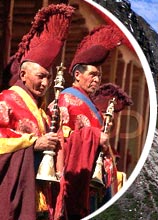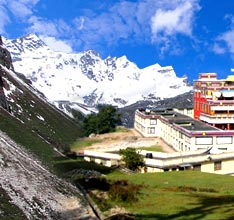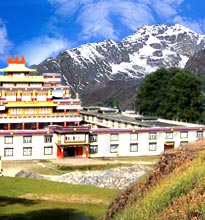Kyongnosla Alpine Sanctuary is an added attraction in
the trip to the eastern part of Sikkim. Located at a distance of 31 kms
from Gangtok, the sanctuary falls on the way to the eminent Tsomgo Lake.
This Alpine Sanctuary sprawls in an area of 31 sq km in the mountainous
terrain. Ranging from altitudes between 3292 meters and 4116 meters,
Kyongnosla Alpine Sanctuary certainly boasts of a wide range of flora
and fauna. The exciting trekking trail to this sanctuary starts from
Kyongnosla Village.
If you happen to be a nature enthusiast, a visit to this sanctuary
would be really delightful for you. Talking about flora, the sanctuary
constitutes figures of rare and endangered species of ground orchid,
tall juniper, silver fir and rhododendron. The ground flora is
fabricated with different species of primulas, wild strawberries,
irises, poppies, rhododendrons, gentians, orchids and the rare panax
(pseudo-ginseng).
It also has many medicinal plants like 'Kutki' (Picrorhiza
Scrophulariflora), 'Jatamasi' (Nardostachs Graandiflora) 'Nilo bikh'
(Aconitun Ferox) and many others. Throughout the year, different
varieties of flowers blossom as per their favorable season. Before the
arrival of winters, Polygonum is the last flower that blooms
anticipating the first snowfall. The Sanctuary also has dense bushes of
bamboos that grow at lower altitude to provide a perfect home for Red
Panda. The dense growth of bamboo also helps in soil conservation.
The Alpine Sanctuary broadens from '15 Mile' Police Check Post up to
the ridges adjoining RongChu and Tsomgo Lake, providing enough space for
the assortment of fauna to exist here. Musk Deer, Serow, Goral,
Himalayan Black Bear, Red Panda, Lesser Cats, Blood Pheasant, Common
Langur, Leopard, Tibetan Fox, Himalayan Marmot, Yellow throated Martens
Weasel, Satyr Tragopan and Impeyan Pheasant are some of the species of
animals that are found in this sanctuary.
Kyongnosla Alpine Sanctuary also has a rich range of avifauna including
Blood Pheasant (the State Bird of Sikkim), Monal Pheasant, Satyr,
Tragopan, Snow Partridges, Laughing Thrushes, Rose Finches, Redbilled
Choughs, Forktails, Redstarts, Blackwinged Kite, Kestrel, Lammergeier,
Griffon vulture, Firetailed Sunbirds and different kinds of migratory
birds. The months between April to August and from October to November
are recommended as the best time to visit the sanctuary.








